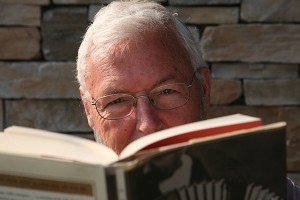Home »

Writing in Food of Love is ribald and funny
Book Review
By Derryll White
Capella, Anthony (2005). The Food of Love.
Meglio un giorno do leone che cento da pecora: “Better to live one day as a lion than a hundred as a sheep.”
 A beautiful young woman gave me this book and suggested I read it. Being delightfully addicted to both love and food, and perpetually under the spell of comely women, I complied. I am also compulsively drawn to coffee and Capella’s description of a vistretti early in the novel secured my interest.
A beautiful young woman gave me this book and suggested I read it. Being delightfully addicted to both love and food, and perpetually under the spell of comely women, I complied. I am also compulsively drawn to coffee and Capella’s description of a vistretti early in the novel secured my interest.
“What came from the spout after that was barely a liquid at all, a red-brown ooze with a hanging quality like honey dripping off the end of a butter knife, with a chesnut-colored crema and a sweet, oily tang that required no sugar, only a gulp of aqua minerale and a bit of sugar-dusted cornetto.”
Now that sounds like an espresso worth experiencing.
The deconstruction the author does of a 3-star restaurant, charting the divisions and responsibilities and how the work gets done, is fascinating. If government worked like this we would certainly be a happier world. Capella points out that order and discipline are paramount, and quality not cost is the measure.
There is an amazing amount of culinary history and detail in this book. The author discusses where dishes came from and the social and economic needs that produced them. It is enough to make a non-gourmand like myself want to eat his way through Italy. The sex is very interesting as well. And the writing is ribald, funny with the barnyard humour many Canadians grew up with. There are many old sayings such as:
A gallina fa l’ovo e ‘o gallo c’abbrucia ‘o culo: “The hen makes the eggs, and the cock just strains his asshole.”
I loved this book. It just proves the old adage – “pay attention to younger women, and love those old enough to know better.” I have watched ‘The Scent of A Woman,’ read this book and now I just have to learn how to cook with more finesse.
********
Excerpts from the novel:
ITALIAN SENSIBILITIES – In a country where literal, fervent Catholicism was only a generation away, every one knew that there were as many grades of virginity in girls as there were in olive oil – which, of course, is divided into extra-virgin (first cold pressing), extra-virgin (second pressing), superfine virgin, extra-fine virgin, and so on, down through a dozen or more layers of virginity and near-virginity, before finally reaching a level of promiscuity so unthinkable that it is labeled merely as “pure” and is fit only for export and lighting fires.
LOVE FOOD – “Well, that’s the difficulty. It will vary from individual to individual. You’d have to really know the person concerned – their history, their background, whether they are raw or refined, dry or oily. You would have to have tasted them, to know whether their own flesh is sweet or savory, salty or bland. In short, you would have to love them, and even then you might not truly know them well enough to cook a dish that would capture their heart.”
IMPRESSIONS OF ITALY – For her, coming to Rome had been the chance of a lifetime, an adventure made even more attractive by her mother’s insistence that it was (a) academically a waste of time and (b) perilously unhygienic, a consequence of the Italians’ notorious inability to wash their hands after using the bathroom.
SEX – “Carlotta,” she began cautiously, “do you ever have random thoughts pop into your head during sex?”
“Of course. Sometimes I think about shoes, sometimes I think about bracelets. It’s generally always accessories though.”
“So, you don’t ever think about being naked on a big black horse and hunting down a small furry animal with the help of a pack of wolves?”
There was a short silence. “Uh-uh.”
FOR CHOCAHOLICS – Eighty-five percent of the world’s chocolate is made from the common or garden-variety Forastero cocoa bean. About 10 percent is made from the finer, more subtle Trinitario bean. And less than five percent is made from the rare, aromatic Criollo bean, which is found only in the remotest regions of Colombia and Venezuela. These beans are so sought after that, pound for pound, they can command prices many times higher than the other local crop, cocaine. Having been fermented, shipped lightly roasted and finally milled to a thickness of about 15 microns, the beans are finally cooked into tablets, even a tiny crumb of which, placed on the tongue, explodes with flavor as it melts.
LOVE FOOD – …the reputation of Il Cuoco, as Dr. Ferroux had predicted, rested partly on the wonderful flavors of the food and partly on the wonderful effect that eating the food had on the female libido. Husbands discovered that their wives forgave them their domestic shortcomings, young men on a first date found that picking up the bill at Il Cuoco was more persuasive than any number of whispered compliments, and lazy boyfriends realized that the subtle seductions of a five-course dinner were a congenial alternative to foreplay.
BALSMAIC VINEGAR – “Do you know why they call it “balsamico?” They used to believe it was a balm that was able to cure anything. Any illness you had.” She reached to the smallest barrel and carefully opened the tap, allowing a tiny amount into the little jug. “Even a broken heart.”
 – Derryll White once wrote books but now chooses to read and write about them. When not reading he writes history for the web at www.basininstitute.org.
– Derryll White once wrote books but now chooses to read and write about them. When not reading he writes history for the web at www.basininstitute.org.







